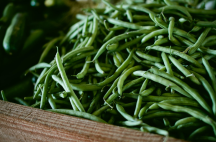
ROOTING FOR A PLANT-BASED DIET
April 7, 2017
A healthy way to switch up your everyday diet
The American diet has long been focused on centering meals around meat and dairy products. While this choice isn’t exactly a poor one, there are healthier alternatives out there that contain the same nutritional benefits without the negative side effects often associated with meat and dairy products, such as high blood pressure, high cholesterol, and other cardiovascular diseases. Plant-based diets have rapidly gained popularity among many, and for good reason! Studies have shown time and again that diets heavy on the plant and light on the animal are helpful in reducing the risk of developing cardiovascular disease, diabetes, and all of the co-morbidities associated with these chronic diseases. Here are some facts as well as common misconceptions about the plant-based diet craze.
Plant-based diets are an excellent source of protein!
It is a common misconception that meat, dairy, and poultry products are the only sources of dietary protein available. In fact, plant-based diets can contain vast amounts of protein, you just have to know what you’re looking for. If you are trying to replace your meat-based protein with a plant-based alternative, look no further than soy! Soy products, such as tofu, taste very similar to their meaty counterparts but are often healthier. If tofu isn’t exactly your thing, not a problem! Black and kidney beans, hummus (made from chick peas), quinoa, and other whole grains are all excellent sources of protein as well. There is also a plant-based protein powder for those who enjoy a scoop of protein powder mixed in with their yogurts, smoothies, and other post-workout drinks. These protein supplements are often made from brown rice and quinoa and have been shown to be just as effective as whey (dairy) protein in helping with muscle recovery after exercise without all of the added sweeteners.
You can obtain essential vitamins and minerals through a plant-based diet!
Another common misconception is that it is extremely difficult to obtain essential vitamins and minerals through a plant-based diet. Iron is often thought of as being found in red meats, and this is true. However, there are many other sources of iron available to someone on a plant based diet! Popeye never ate a slab of meat before he saved the day; he ate a can of spinach! Spinach, kidney beans, cashews, soybeans, raisins, and cabbage all contain ample amounts of iron to help keep you feeling strong all day long!
When you think of calcium, you usually think of the old “Got Milk” commercials. While drinking milk is an excellent source of calcium, dairy products often can cause an upset stomach and digestive issues. If you don’t like the way a tall glass of milk makes your tummy feel, try plantbased alternatives! Kale is a great source of calcium, as are tofu (soy) and cabbage! Adding kale to a smoothie or salad is a simple, refreshing way to get your daily dose of calcium without upsetting your gut.
“Diets focused more on plants (fruits, vegetables, and grains) help to significantly reduce the risk of high blood pressure, stroke, heart disease, and diabetes.”
There’s no need to cut out meat and diary entirely! Just shift the main focus of your meals to plants!
Just because it’s a plant-based diet doesn’t mean that you can’t eat meat and dairy! Just try to focus a little less on the animals and a little more on the plants! The Dietary Guidelines Committee of the Department of Health and Human Services has reported studies that have shown time and again that diets focused more on plants (fruits, vegetables, and grains) help to significantly reduce the risk of high blood pressure, stroke, heart disease, and diabetes. By taking the small steps to add more plants to your daily diet, you will be able to do all of the things you love while feeling happy and healthy! Be sure to talk to your Physical Therapist about the benefits of adding more plants to your diet as they are knowledgable and able to provide you further insight into this healthy trend.
References
Joy, Jordan M.; et al. The effects of 8 weeks of whey or rice protein supplementation on body composition and exercise performance, 2013. Nutrition Journal. DOI:10.1186/1475-
2891-12-86
Report of the Dietary Guidelines Advisory Committee on the dietary guidelines for Americans, 2010: to the Secretary of Agriculture and the Secretary of Health and Human Services. Washington, DC: Agriculture Research Service, US Department of Agriculture, US Department of Health and Human Services; 2010. May

